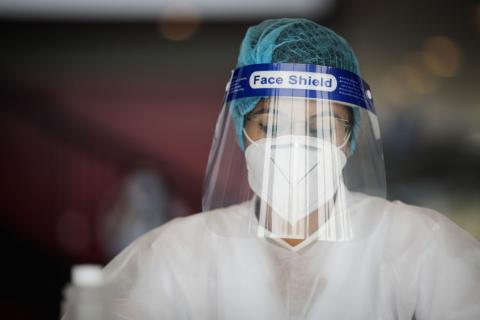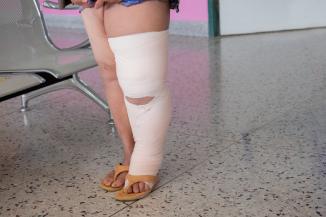Wound Care Perspectives: The Cost of Caring During the Pandemic
July 21, 2020
Nurses week, which took place in May, may have fallen a little flat this year, as employers were not able to gather staff and celebrate as they might otherwise have done, but the caring continues. As a group, we have been recognized as essential. In managing wounds, nurses play a vital role in supporting patients' progress toward healing, as well as prevention. It is likely our recognition will last a while, as generally nurses come out on top in polls that ask which profession is the most trusted and caring. Unfortunately, our assistant colleagues, who care just as much, don't do so well when it comes to their pay packet.
The Things We Don't Share as Care Providers
It is almost unheard of for health care professionals to talk about how much they earn, and it is discouraged to the point of being a dismissible "offense" in some places. It is time for people to start talking money because it is only with this level of transparency that some fairness can begin to occur. Caring for the elderly in a facility that specializes in elderly care and rehabilitation is hard work, not just physically but also mentally. Being able to empathize and have authentic compassion without getting worn out is no easy task, and it is time society recognized this. Giving bonuses to nursing assistants during a pandemic is not an answer. Paying people who are caregivers higher wages has to happen, and the time to start is now.
Pressure Injury Prevention: Taking It Back to the Basics During National Nurses Week
The term "essential workers" has grown and extends to the supermarket cashier, refuse employees, and migrant workers; all are worthy of our applause and pan-banging fervor. They are also deserving of a living wage. People who work deserve to be paid for the work they do. People who can't work need our help to get the support for their health and well-being, as well as keep food on the table and a roof over their heads without losing everything they have worked so hard for. This is not socialism—it is basic humanity.
Essential Workers at the Bedside
A decent wage for those who support our doctors, nurses, and therapists is not considered necessary because being an assistant requires no education, just a bit of training. Many caregivers enter the role because they find caregiving rewarding in a personal sense. Those who struggle at school but don't "make the grade" are often channeled into caregiving roles, which is great, if they care. If not, it is a travesty.
Just because a person is a doctor, nurse, or therapist does not mean they are able to perform the caregiving role of a nursing assistant. I know of nurse practitioners who have never performed personal hygiene for anyone or done preventative pressure injury care. It would be really helpful if it was mandatory for all clinicians during the course of their education to work as a nursing assistant for at least 12 weeks. This would perpetually invigorate support staff at the bedside, increase the pool of health care assistants, and improve the relationship of clinicians with the people who support them. Caregivers at assisted living, long-term care, acute rehabilitation, and Alzheimer's support facilities have struggled through the last five months, and people in lockdown have sung their praises and applauded them to give support. Governors have organized bonuses, so they end up with more money than if they joined the long line of the unemployed. All this while some of the organizations employing them have, over the years, increased the cost of care to residents, reduced staffing ratios within their facilities, and allowed wages to deteriorate markedly.
Corporate nursing homes have been known to outsource elements of their business to other companies they own. This model would mean they are able to keep the facility running lean while the other company makes the profit. I believe that the corporate model does not belong in health care. It is time to see this gross abuse of a vulnerable population for what it is: corporate greed. The concept of corporate social responsibility might be thought of as an answer, but it is, at best, just adequate.
If transparency is added to corporate social responsibility with employee involvement and partnership, opportunism is more difficult, and honesty has to operate. How much more than a health care assistant should a CEO of an organization get, and can the amount paid be justified? Is it reasonable to cut positions that support nursing and not allow basic educational opportunities that will improve patient outcomes while the organization's top tier continues to be paid salaries that allow them to have a second home, a boat, and much more icing on the cake than is reasonable?
A Caring Solution
As we transition from the industrial age to the digital era, one thing is overwhelmingly clear: Caring is not digitizable and cannot be performed by a machine, however well programmed with the very best artificial intelligence. Placing care as a valuable asset and one that is worth paying for has to happen. The pandemic has shown us that our health care system is broken. With the coming recession and changes in the environment from the impact of the industry that sustains us will also come the possibility of a profound change into a post-consumerism digital age. Making this change, one that positively impacts our humanity and begins the process of leveling the playing field, will have to be a conscious effort. Transparency in government and management is key to the process, and just now, from the perspective I have, it seems too far away to secure the future for my grandchildren.
Suggested Reading
Kaplan GS. Building a culture of transparency in health care. Harvard Business Review, November 9, 2018. https://hbr.org/2018/11/building-a-culture-of-transparency-in-health-ca…. Accessed July 5, 2020.
About the Author
Margaret Heale has a clinical consulting service, Heale Wound Care in Southeastern Vermont and draws on her extensive experience as a wound, ostomy and continence nurse in acute and long-term care settings to provide education and holistic care in her practice.
The views and opinions expressed in this blog are solely those of the author, and do not represent the views of WoundSource, HMP Global, its affiliates, or subsidiary companies.












Follow WoundSource
Tweets by WoundSource